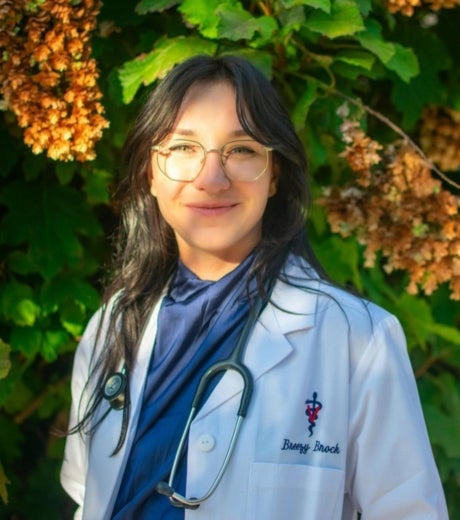Funding Opportunities
IIZD invests in the next generation of scientific discovery through competitive pilot awards and fellowships. These funding opportunities provide critical support for trainees and investigators pursuing high-impact questions in zoonotic infectious diseases and mRNA technologies.
The IIZD Pilot Award Program
IIZD has created a pilot award program designed to catalyze innovative studies and foster interdisciplinary collaborations that advance our understanding of zoonotic infectious diseases and mRNA-based technologies.
Awards are generally up to $50,000 for infectious disease research projects and up to $150,000 for basic or translational mRNA research projects. Principal Investigators must hold a faculty appointment at the University of Pennsylvania, Children’s Hospital of Philadelphia, or the Wistar Institute, and the PI or Co-Investigator must be a Penn Vet faculty member.
| Year | Title | PI(s) | Amount |
|---|---|---|---|
| 2024 | The extracellular matrix (ECM) modulates filovirus infectivity | Ron Harty, Paul Janmay | $50,000 |
| 2024 | Surveillance for infectious agents in cases of fatal canine pneumonia in the greater Philadelphia area | Katie Mulka, Stephen Cole | $50,000 |
| Year | Title | PI(s) | Amount |
|---|---|---|---|
| 2023 | A comparative analysis of colonization rates and antimicrobial resistance patterns of bacteria isolated from human clinical, agricultural, environmental, and animal husbandry settings in Botswana. | Laurel Redding, Naledi Mannathoko | $50,000 |
| 2023 | Role for X-chromosome inactivation in female-biased enhancement of immune responses to influenza | Montserrat Anguera | $50,000 |
| 2023 | Exploring the threat of tick-borne diseases on the Galápagos Islands: A community-based initiative on San Cristóbal Island. | Ricardo Castillo-Neyra, Daniel Beiting | $27,397.50 |
| 2023 | Estimated prevalence, taxonomic diversity, and zoonotic implications of gastrointestinal helminths isolated from free-ranging mustelids in the mid-Atlantic, USA. | Kevin Niedringhaus, Caroline Sobotyk | $22,602.50 |
| Year | Title | PI(s) | Amount |
|---|---|---|---|
| 2022 | Development of an organoid model system to study SARS-CoV-2 in white-tailed deer | Elizabeth Lennon, Susan Weiss | $50,000 |
| 2022 | Evaluation of free-ranging deer as a reservoir for SARS-CoV-2 | Eman Anis, Erick Gagne, Brendan Kelly, Susan Weiss, Rick Bushman | $15,000 |
| 2022 | Evaluation of UV-C disinfection technology for veterinary settings | Stephen Cole | $35,000 |
| 2022 | Metagenomic control of mRNA vaccine efficiency | Norbert Pardi, Thomas Schaer, Christoph Thaiss | $50,000 |
| 2022 | Modeling COVID-19 comorbidities with novel humanized ACE2 mice | Andrew Vaughan | $25,000 |
The Martin and Pamela Winter Infectious Disease Fellowship Program
IIZD is committed to preparing the next generation of research scientists and biomedical leaders to address the challenges posed by zoonotic infectious diseases. To support this mission, IIZD offers fellowships for pre- and post-doctoral trainees conducting innovative research on infectious diseases in humans, agricultural and domestic animals, or wildlife. Fellowships provide $35,000 per year for one to two years (contingent on progress and funding availability), with additional support expected from the sponsor laboratory.
Meet the 2025 Martin and Pamela Winter Infectious Disease Pre-Doctoral and Post-Doctoral Fellows
Breezy Brock, VMD, PhD Candidate
Mentors: Drew Weissman, MD, PhD; Roberts Family Professor in Vaccine Research, Department of Medicine, Perelman School of Medicine, University of Pennsylvania. Edward Kreider, MD, PhD; Assistant Professor of Medicine, Division of Infectious Diseases, Perelman School of Medicine, University of Pennsylvania.
Project Overview: A tell-tail sign: Cytoplasmic tail modifications of an HIV-1 glycoprotein immunogen to enhance antigen surface expression and localization in an mRNA vaccine
Surface expression and spatial organization of the HIV Envelope protein (Env) are critical for B cell precursor engagement but are often limited by internalization motifs within the cytoplasmic tail (CT), which reduce antigen availability. My project aims to develop a next-generation HIV vaccine immunogen by introducing CT mutations into a stabilized trimeric Env protein to enhance surface expression and localization to specialized plasma membrane microdomains. These modifications, delivered via mRNA to express membrane-bound HIV Env de novo, aim to enhance antigen availability and microdomain localization to improve early B cell priming and antibody responses, ultimately guiding future immunogen design for HIV and other complex viruses.

Clara Malekshahi, PhD Candidate
Mentor: Louise Moncla, PhD; Assistant Professor, Department of Pathobiology, School of Veterinary Medicine, University of Pennsylvania.
Project Overview: Identifying the role of reservoir movement in highly pathogenic avian influenza transmission
In late 2021, a highly pathogenic avian influenza (HPAI) H5N1 virus of clade 2.3.4.4b was detected in North America. It has since caused the deaths of thousands of wild birds and hundreds of millions of domestic birds. This North American HPAI outbreak is maintained in wild reservoir hosts (ducks, geese, and swans), and viral spread is likely linked to the four major flyway routes used by migratory wild birds in North America. My work explores the role of reservoir host ecology in the transmission and movement of HPAI in North America. I use phylodynamic and phylogeographic methods to model the geographic spread of HPAI across North America and assess the degree of correlation with the migration of particular host species. My work can be used to quantify spillover risk, strengthen agricultural biosecurity, and establish protections for a range of wildlife.

Maria Maltepes, PhD Candidate
Mentor: Louise Moncla, PhD; Assistant Professor, Department of Pathobiology, School of Veterinary Medicine, University of Pennsylvania.
Project Overview: Characterizing the evolutionary mechanisms that shape host-switching in H3Nx influenza A viruses
I am investigating the evolutionary history of H3Nx influenza A viruses (IAV), a project inspired by the 2023 canine influenza outbreak in Philadelphia. Like most IAVs, canine H3N2 influenza is avian-derived, highlighting how adaptation after a cross-species event has led to sustained circulation in a new host. Given that H3Nx viruses infect a wide range of species, this virus is a fitting system for uncovering the evolutionary mechanisms that enable the emergence of novel host clades. To do this, I am using phylogenetic methods to assess whether adaptive substitution and reassortment rates vary by host. My research aims to analyze how host adaptation shapes IAV evolution, providing critical insights to predict and prevent future zoonotic spillovers.

Jaydeen Sewell, PhD Candidate
Mentor: Sunny Shin, PhD; Professor of Microbiology, Department of Microbiology, Perelman School of Medicine, University of Pennsylvania.
Project Overview: Understanding the mechanism by which Coxiella burnetii effector protein CBU1314 interacts with the human polymerase associated factor 1 complex.
Coxiella burnetii is an obligate intracellular bacterium that evades many cell-intrinsic innate immune defenses. Due to this, we label it as a stealth pathogen. Coxiella is a huge burden to farmers as it typically infects livestock such as dairy cows, goats, and sheep. What is even more detrimental is that in humans who are infected with Coxiella, chronic Q fever can develop, requiring 2-3 years of antibiotic treatment. My work focuses on understanding how Coxiella uses its unique repertoire of proteins to evade multiple immune defense mechanisms. Specifically, we have identified an effector CBU1314 that modulates inflammatory gene expression and interacts with the host transcription machinery. My goal is to understand how CBU1314 uses this interaction to suppress the inflammatory response and potentially identify a target for improving Q fever treatment.

Mate Vadovics, PhD
Mentor: Norbert Pardi, PhD; Associate Professor of Microbiology, Department of Microbiology, Perelman School of Medicine, University of Pennsylvania
Project Overview: Development of an mRNA–lipid nanoparticle-based platform for delivering antimicrobial peptides
Fungal infections are an increasingly serious global health concern. With a background in fungal pathogenesis from my PhD and my current postdoctoral research in mRNA–lipid nanoparticle (mRNA-LNP) vaccines and delivery systems, I aim to develop a platform that uses mRNA-encoded antimicrobial peptides, encapsulated in LNPs, to target drug-resistant Candida and potentially other emerging zoonotic fungal infections. This project bridges fundamental research in immunology and microbiology with translational strategies to combat infectious diseases.

Nuriban Valero-Pacheco, PhD
Mentor: Montserrat Anguera, PhD; Associate Professor, Department of Biomedical Sciences, School of Veterinary Medicine, University of Pennsylvania.
Project Overview: The inactive X chromosome: A protective factor for females in SARS-CoV-2 infection in mice
Sex-based differences in the severity of zoonotic respiratory viruses like SARS-CoV-2 remain poorly understood, despite consistent evidence that females experience milder outcomes. My project explores how X chromosome–linked regulatory mechanisms in females influence lymphocyte responses during viral infections. We found that epigenetic differences can alter lymphocyte gene expression, potentially enhancing female antiviral defense. This research aims to reveal key insights into sex-specific immunity.

Raegan Petch, University of Pennsylvania
- Project Overview: I am working to develop a second-generation recombinant vesicular stomatitis virus vaccine for Severe Fever with Thrombocytopenia Syndrome Virus (rVSV-SFTSV). First-generation vaccines are highly attenuated in cell culture, which makes it difficult to produce sufficient vaccine for clinical trials. I am introducing mutations to the glycoprotein of SFTSV that we hypothesize will increase the replication capacity of the virus in vitro and in vivo and improve the immunogenicity of the vaccine candidate in animal models.
- Mentor: Paul Bates, PhD; Professor of Microbiology, Perelman School of Medicine, University of Pennsylvania
Daana Roach, University of Pennsylvania
- Project Overview: Lipocalin-2 (LCN2), initially identified as a neutrophilic protein for innate immunity, has broader roles. Our lab found LCN2 expression in the intestinal epithelium of inflammatory bowel disease (IBD) patients, not in healthy subjects. The impact of epithelial-specific LCN2 on function and physiology is less understood. Goblet cells, a secretory cell type in the intestinal epithelium, express LCN2 and secrete mucus, including antimicrobial peptides like LCN2, affecting the epithelium-luminal contents interaction. LCN2 also influences immune cell activity. In IBD, chronic inflammation occurs due to persistent intestinal epithelium injury and repeated exposure of mucosal immune cells to luminal contents. The effect of epithelial-specific LCN2 on immune cell activity in IBD and at homeostasis is unclear. The project aims to understand how goblet-cell expression of LCN2 influences cell function in IBD and epithelial-immune interaction.
- Mentor: Kate Hamilton, PhD; Assistant Professor of Pediatrics (Gastroenterology, Hepatology and Nutrition), Children’s Hospital of Pennsylvania
Helen Stillwell, University of Pennsylvania
- Project Overview: In 2012, wild-type MERS-CoV spilled over from camels into humans in Saudi Arabia, causing severe lower respiratory tract disease with a mortality rate of 36%. In northern Africa, related clade C MERS viruses circulate in camels but do not appear to cause disease in humans. Helen is studying the differences in the innate immune response to these viruses in human and camelid primary nasal epithelial air-liquid interface (ALI) cultures to better understand this divergence in pathogenicity.
- Mentor: Susan Weiss, PhD; Professor of Microbiology, Perelman School of Medicine, University of Pennsylvania
Abigail Daniels, University of Pennsylvania
- Project: Investigating the molecular mechanisms of gamete interaction in Cryptosporidium
- Mentor: Boris Striepen, PhD; Mark Whittier and Lila Griswold Allam Professor of Microbiology and Immunology, School of Veterinary Medicine, University of Pennsylvania
Christien Patrick M. Exconde, University of Pennsylvania
- Project: Uncovering and characterizing the mechanism of Toxoplasma gondii-induced pyroptosis
- Mentor: Cornelius Taabazuing, PhD; Assistant Professor, Perelman School of Medicine, University of Pennsylvania
Kevin Mears, University of Pennsylvania
- Project: Investigating the role of interferon lambda in protection against severe Clostridioides difficile infection
- Mentor: Michael C. Abt, PhD; Assistant Professor, Perelman School of Medicine, University of Pennsylvania
Matthew Martinez, University of Pennsylvania
- Project: Defining invasion strategies of malaria parasites
- Mentor: Yi-Wei Chang, PhD; Assistant Professor of Biochemistry and Biophysics, Perelman School of Medicine, University of Pennsylvania.
Khabadire Tlotleng, Botswana University of Agriculture & Natural Resources
- Project: Identification of canine parvovirus variants
- Mentor: Eman Anis, DVM, MVSc, PhD, ACVM; Assistant Professor of Pathobiology, School of Veterinary Medicine, University of Pennsylvania
IIZD is not currently accepting pilot or fellowship applications. Please subscribe to our newsletter to stay informed about upcoming funding opportunities.
